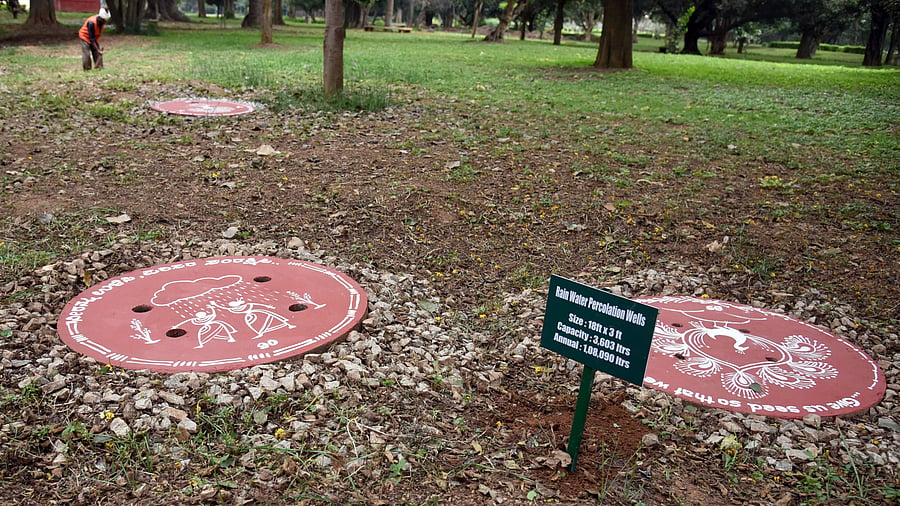
Percolation wells in Lalbagh.
Credit: DH file Photo
Bengaluru: The impact of percolation wells dug at Lalbagh is being felt significantly now. A long-term study has shown that groundwater levels in Lalbagh have increased by close to four metres since 2021 when work on percolation wells began.
In Lalbagh, close to 440 percolation wells have been dug by United Way of Bengaluru (UWBe), a non-profit organisation, to capture runoff water, impacting the ground water levels directly.
“Percolation wells have been able to collect close to 56,365 cubic metres of runoff rainwater which has percolated into the water table, improving the water levels,” said Sriram Ananthanarayanan, director, new initiatives and impact, UWBe.
As a result of the improvement in groundwater levels, the area which was once categorised as ‘over exploited’ with 103% extraction of groundwater, has now moved to ‘safe’ levels with just 64% groundwater extraction.
While percolation wells have played a major factor in improving groundwater levels, other natural factors may have also had some impact on the groundwater levels, representatives from UwBe maintained.
Horticulture department officials said many borewells that had dried up have come back to life and dependence on piped water has reduced significantly.
“The health of many deep rooted trees and perennial trees has also improved. Need for sprinklers has come down drastically and now they are mostly used only in summer,” said M Jagadeesh, joint director, Lalbagh Botanical Garden.
Apart from improving groundwater levels, percolation wells have helped in many other ways including preventing of floods.
“During rains, water going out of Lalbagh would flood surrounding areas. Now, that close to 40% of the runoff water is collected in percolation wells, water going outside has reduced, preventing floods,” Ananthanarayanan said.
Jagadeesh also said that in many areas inside Lalbagh, soil erosion owing to runoff water has come down.
“The runoff water would come down with force and result in soil erosion in a few areas. Now that the rainwater percolates into the ground, soil erosion has also come down significantly,” he said.
Various organisations are working closely with the Greater Bengaluru Authority (GBA) to dig up percolation wells in parks and other open spaces. So far, in Bengaluru, over 2.5 lakh such wells have been dug up and many more have been planned.
Benefits of percolation wells
* Improvement in groundwater levels
* Prevents soil erosion
* Prevents floods in surrounding areas
* Improves health of deep rooted and perennial trees